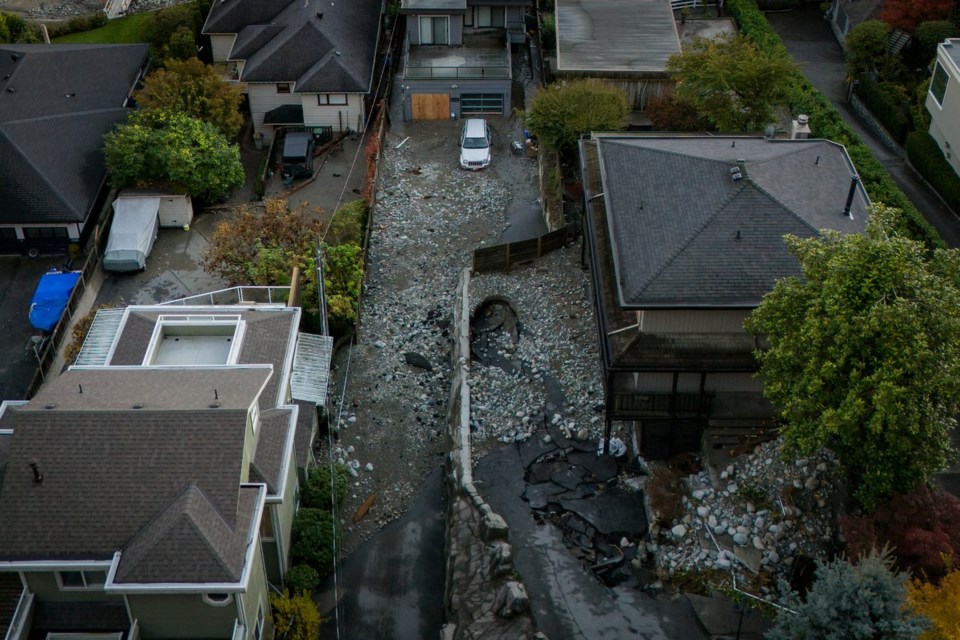The District of North Vancouver is getting ready for another bout of rain after an atmospheric river weather system drenched B.C.'s south coast last weekend, triggering a mudslide and localized flooding that killed at least three people.
The North Shore mountains could see another 75 millimetres of rain this weekend, and Lisa Muri, a councillor with the district, said staff were preparing by cleaning up culverts and placing sandbags throughout the community.
Muri said last weekend's storm was unprecedented, bringing nearly 350 millimetres of rain to North Vancouver over three days.
The downpours caused creeks to swell and pick up wood debris and gravel that blocked culverts and drainage channels, she said, sending torrents of brown water down streets in the waterfront neighbourhood of Deep Cove.
District Mayor Mike Little said on Thursday that his daughter heard about the flooding in Deep Cove last Saturday and they headed to the area.
"We drove down, and within 10 minutes, the entire contents of Gallant Creek was overflowing over the road," he said, adding they immediately called the fire department to come and block off nearby roadways.
"It was very, very shocking to see how much water was coming down the road."
Several Deep Cove businesses have taken to social media to share their experiences with the flooding, including Caf/EH, a restaurant that shared a statement saying it is closed until further notice after sustaining extensive damage.
Little said Gallant Creek has seen other "significant rainfalls" in the last decade, and the district has been working to upgrade the catch basin system.
But last weekend's rainfall was so intense, it overwhelmed the system, he said.
Ken Dosanjh, a meteorologist with Environment and Climate Change Canada, said the rain in the forecast this weekend will be "nothing" compared with the last storm, and it will come in a series of "pulses" rather than forming an atmospheric river.
He said North Vancouver could see up to 75 millimetres of rain in the coming days, but it will fall over multiple days at a lower intensity than it did last weekend.
"With the atmospheric river, we saw precipitation rates on the order of 10, even upwards of 20 millimetres an hour, which is extremely high," he said Thursday.
"In this case, we're noticing precipitation rates kind of fall around four to eight millimetres per hour, maybe reaching 10 (in) extreme cases."
Little said District of North Vancouver crews had been working throughout the week to ensure drainage basins are clear for this weekend's expected rain.
"We've been out scooping up the rock and debris that came down the creeks and rivers out onto the streets all across the district," he said Thursday.
Little said he's confident the district's systems will be able to handle the rain in the forecast for this weekend, though he's concerned that certain areas are still "vulnerable to a moderate amount of rainfall" after the recent drenching.
He said the Woodlands area of North Vancouver has seen rocks falling into creeks since last weekend, and the channels need to be cleared out.
Little, whose basement was also flooded, said some homes in the district are "seriously damaged," and it will take residents time to recover.
Muri, too, said the district has been working to mitigate the risks of heavy rains and flooding, but the sheer volume of rain last weekend was difficult to manage.
"It's not like we're going to be able to completely stop flooding in the future, because Mother Nature and climate change are very, very fierce," she said.
"We can't engineer ourselves out of climate change. We just have to prepare, be proactive and mitigate where we can."
This report by The Canadian Press was first published Oct. 24, 2024.
Nono Shen and Brenna Owen, The Canadian Press




